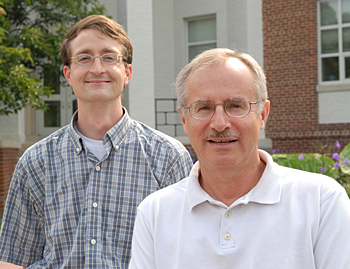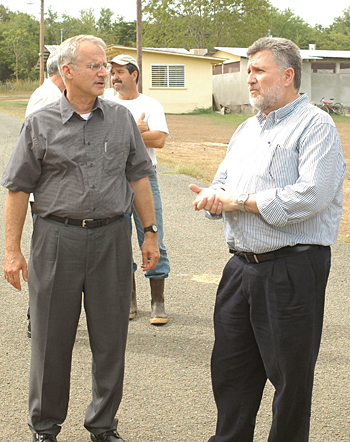
The original grant, awarded to the University of Maryland and its partners in 2005, was used to establish a research and education project to help prevent and control avian influenza.
Jack Gelb, chairperson of the department of animal and food sciences and professor of avian virology, and Eric Benson, associate professor of bioresources engineering, along with many other UD scientists, conduct research and extension programs that provide solutions and assistance to the poultry industry, a major food resource and economic driver on the Delmarva Peninsula.
Avian influenza research and outreach activities at UD are supported by AICAP, as well as state and other federal funds. Projects include surveillance programs in commercial poultry, backyard flocks and wild birds; development of rapid diagnostic tests; emergency poultry depopulation research; in-house composting for responding to catastrophic poultry losses; efficacy of disinfectants and common chemical compounds on avian influenza virus; viral pathogenesis and vaccine evaluations; and regional, national and international technical assistance programs.
“The AICAP is unique and is successful because it brings together top scientists to broadly address avian influenza challenges facing animal agriculture," Gelb said. "It basically applies the land-grant agricultural philosophy to an important disease with clear poultry health consequences and potential human health implications.”
Benson and Gelb recently returned from a visit to the University of Puerto Rico Mayaguez--with which UD has an institutional collaborative agreement--where they spoke to representatives from industry, academia, extension, the government and media about UD's role in avian influenza research and emergency response on Delmarva.
“UD's avian influenza emergency response and diagnostic programs are known throughout the world,” Benson said. “We have worked with scientists from Turkey, India, Bulgaria [http://www.udel.edu/PR/UDaily/2008/nov/birds112107.html], Romania [http://www.udel.edu/PR/UDaily/2007/oct/avain100506.html], and a variety of other countries as a result of our involvement in AICAP.”
Besides UD and the University of Maryland, institutions participating in AICAP are Virginia Tech, Auburn University, University of California-Davis, University of Georgia, USDA-ARS-Southeast Poultry Research Laboratory, Ohio State University, Oregon State University, Texas A&M University and Western University Health Sciences.
AICAP goals include epidemiology, basic research, diagnostics, vaccines and education. Since 2005, AICAP researchers and educators have:
- Assembled the first continent-wide network to study the ecological and biological characteristics of avian influenza viruses isolated from wild birds;
- Integrated research and education into a unique program available to a range of poultry producers;
- Shown that quail can change and expand the host range of avian influenza viruses, and found that quail respiratory and intestinal tracts have human-like sialic acid receptors that could partially explain the emergence of avian influenza strains with the capacity to infect humans;
- Developed a comprehensive program that has been delivered in 33 states and in Canada and Brazil to train producers and veterinarians on the depopulation and composting of flocks with avian influenza;
- Developed a testing component for rapid diagnosis of avian influenza in birds; and
- Developed promising vaccines for mass immunization of birds.

The University of Delaware's Lasher Laboratory--at the Elbert N. and Ann V. Carvel Research and Education Center in Georgetown, Del.-- provides “time-sensitive diagnostic services to the poultry industry on a daily basis and helps to implement research findings.” Through their efforts, poultry industry health officials are kept abreast of emerging diseases.
“This group of dedicated professionals has contributed greatly to poultry disease diagnostics and applied research over many years," said Bill Satterfield, DPI's executive director. "Their individual years of service range from three to 22 years. During this time, under various leaders, the lab has grown from a small unit to a full-fledged, world-class poultry diagnostic facility, offering important, technologically advanced, poultry diagnostic services.”
Recognized at the event were laboratory team members Brenda Sample (22 years of service), Colby Smith (15 years), Kathy Phillips (15 years), Luanne Sullivan (five years) and Billie Jean Wright (three years). The team routinely performs surveillance for avian influenza among commercial broiler chickens and backyard flocks and tests diseased flocks.
“One of this group's watershed moments was when the workloads peaked at an all-time high in 2004, the year Delmarva's chicken industry encountered and successfully controlled low-pathogen avian influenza," Satterfield said. "These individuals were the backbone of poultry diagnostic services on Delmarva, with the help of other colleagues in the University of Delaware and in the region. Our industry owes a great deal to this team for its talents, willingness to pitch in when necessary, and hard work over the years.”
For more information about the University of Delaware's poultry health system and the Avian Bioscience Center visit [http://ag.udel.edu/abc/index.html].
Article by Katy O'Connell, AG '00

